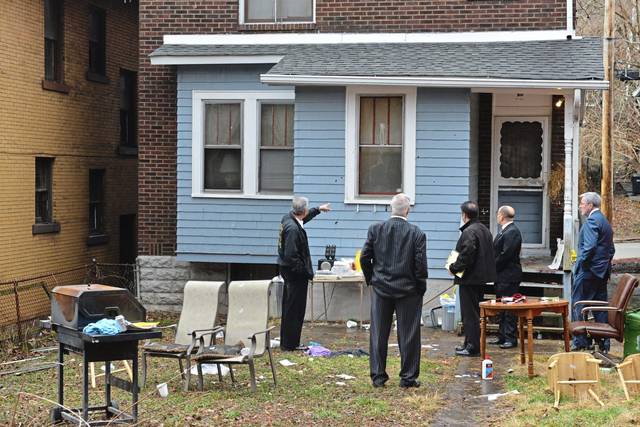https://triblive.com/local/pittsburgh-allegheny/defense-repeats-calls-for-a-mistrial-in-wilkinsburg-shooting-case-as-jurors-remain-undecided-on-a-verdict/
Defense repeats calls for mistrial in Wilkinsburg shooting case as jurors remain undecided on verdict

More testy court filings on Thursday in the 2016 Wilkinsburg mass shooting case hurled more accusations at prosecutors as jurors wrapped up their third day of deliberations without rendering a verdict.
The filing by defense attorney Randall McKinney, who represents homicide suspect Cheron Shelton, renewed calls for a mistrial in the death penalty case. Judge Edward J. Borkowski denied the motion. Jury deliberations will resume Friday.
McKinney also re-upped claims that prosecutors withheld evidence, including the extent to which they worked with Kendall Mikell, a jailhouse informant who was until this point referred to as Witness 1.
Mikell, under the name Witness 1, was quoted extensively in the arrest warrant against Shelton and a former co-defendant in the March 9, 2016, massacre at a backyard cookout that killed five adults and an unborn child.
McKinney, in a motion filed last week and unsealed Wednesday, said Mikell came forward Feb. 3 and said prosecutors and detectives encouraged him to fabricate evidence and paid him for information. Mikell said he was paid thousands of dollars over the course of several years, something McKinney said the defense knew nothing about.
“The defense would have used this vital information to litigate challenges to the probable cause affidavit and subsequent pretrial motions …” McKinney wrote.
Deputy District Attorney Kevin Chernosky, who is prosecuting the case with Assistant District Attorney Lisa Pellegrini, called the claims “unfounded and frivolous.”
Chernosky noted that Mikell was never called at Shelton’s preliminary hearing nor did he testify at trial, and prosecutors notified the defense in 2018 that they no longer intended to use him as a witness.
Dismissing those later actions, McKinney wrote that what mattered is “their arrest and subsequent investigation relied on (Mikell’s) actions and statements.”
Chernosky wrote that Mikell was provided about $1,700 from the DA’s witness relocation fund to find housing after he was released from a halfway house in April 2018. That happened after Mikell was briefly entered into the Attorney General’s Witness Relocation Program. After 10 days, Mikell was arrested, which disqualified him from the program.
In McKinney’s latest filing, he included Mikell’s form for the attorney general’s program. On it, Mikell marked “no” for a question asking whether the witness is “receiving financial benefits from a police agency” for their cooperation.
McKinney said he received that form as part of discovery materials in 2017 but didn’t know until this week that Mikell was paid thousands of dollars.
Mikell also marked “no” regarding any pending criminal or civil cases. McKinney said Mikell was wearing a prison uniform during his first interview with prosecutors, “so they had to know … he had pending criminal cases contrary to said agreement given to defense.”
“The self-righteous denial by the Commonwealth does not justify or excuse withholding the information they today admit, now they have been exposed, combined with other key facts including this witness is a career paid informant,” McKinney wrote.
Mikell, in an hourlong interview with McKinney by phone last week, claimed he was at one point placed in a cell directly next to Shelton so he could attempt to get information out of Shelton. During that time, he said, Shelton professed his innocence. McKinney said he wasn’t aware of that, either.
The defense has for weeks accused prosecutors of violating the Brady rule, which states prosecutors must turn over any exculpatory evidence to the defense.
“The Commonwealth,” McKinney wrote, “is not absolved of their obligations under Brady or of misconduct because they chose to remove this witness from the landscape and cannot fix it by admitting to said payments during jury deliberations.”
Copyright ©2026— Trib Total Media, LLC (TribLIVE.com)
